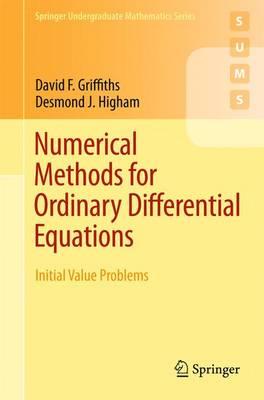Overview
Numerical Methods for Ordinary Differential Equations is a self-contained introduction to a fundamental field of numerical analysis and scientific computation. Written for undergraduate students with a mathematical background, this book focuses on the analysis of numerical methods without losing sight of the practical nature of the subject. It covers the topics traditionally treated in a first course, but also highlights new and emerging themes. Chapters are broken down into `lecture' sized pieces, motivated and illustrated by numerous theoretical and computational examples. Over 200 exercises are provided and these are starred according to their degree of difficulty. Solutions to all exercises are available to authorized instructors. The book covers key foundation topics: o Taylor series methods o Runge--Kutta methods o Linear multistep methods o Convergence o Stability and a range of modern themes: o Adaptive stepsize selection o Long term dynamics o Modified equations o Geometric integration o Stochastic differential equations The prerequisite of a basic university-level calculus class is assumed, although appropriate background results are also summarized in appendices. A dedicated website for the book containing extra information can be found via www.springer.com
Full Product Details
Author: David F. Griffiths ,
Desmond J. Higham
Publisher: Springer London Ltd
Imprint: Springer London Ltd
Edition: 2010 ed.
Dimensions:
Width: 15.50cm
, Height: 1.50cm
, Length: 23.50cm
Weight: 0.900kg
ISBN: 9780857291479
ISBN 10: 0857291475
Pages: 271
Publication Date: 25 November 2010
Audience:
College/higher education
,
Undergraduate
Format: Paperback
Publisher's Status: Active
Availability: In Print

This item will be ordered in for you from one of our suppliers. Upon receipt, we will promptly dispatch it out to you. For in store availability, please contact us.
Reviews
From the reviews: This book by Griffiths (Univ. of Dundee, UK) and Higham (Univ. of Strathclyde, UK) introduces the fields of numerical analysis and scientific computation. ... Overall, there are many examples and exercises for students to read and try. ... The work is very readable for an introductory course. An undergraduate who has completed at least the full calculus sequence should find the material interesting and accessible. Summing Up: Recommended. Lower-division undergraduates. (S. L. Sullivan, Choice, Vol. 48 (10), June, 2011)
<p>From the reviews: This book by Griffiths (Univ. of Dundee, UK) and Higham (Univ. of Strathclyde, UK) introduces the fields of numerical analysis and scientific computation. Overall, there are many examples and exercises for students to read and try. The work is very readable for an introductory course. An undergraduate who has completed at least the full calculus sequence should find the material interesting and accessible. Summing Up: Recommended. Lower-division undergraduates. (S. L. Sullivan, Choice, Vol. 48 (10), June, 2011)
From the reviews: This book by Griffiths (Univ. of Dundee, UK) and Higham (Univ. of Strathclyde, UK) introduces the fields of numerical analysis and scientific computation. ! Overall, there are many examples and exercises for students to read and try. ! The work is very readable for an introductory course. An undergraduate who has completed at least the full calculus sequence should find the material interesting and accessible. Summing Up: Recommended. Lower-division undergraduates. (S. L. Sullivan, Choice, Vol. 48 (10), June, 2011)




